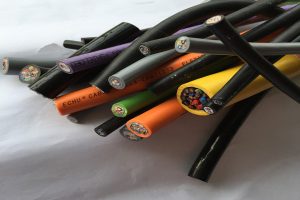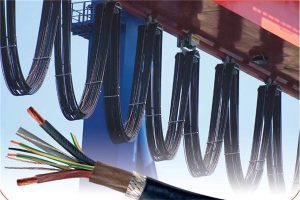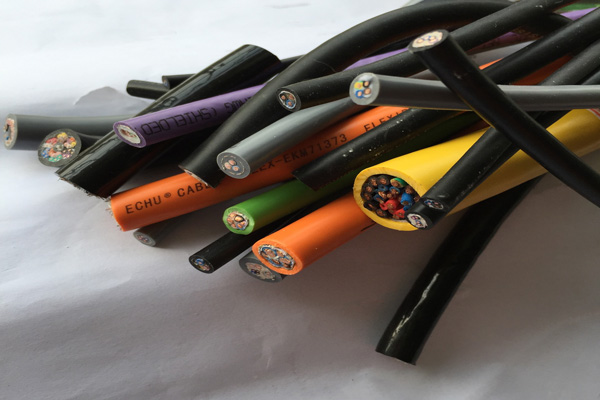Drag chain cable is a kind of can follow the drag chain to move back and forth and does not easily wear and tear highly flexible special cables will be called drag chain cable, usually can also call drag cable or tank chain cable.
The cable in the equipment unit needs to move back and forth on occasion, to prevent cable entanglement, wear and tear, pull-off, hanging, and scattered, put the cable into the cable chain, the cable form protection, and the cable can be realized with the drag chain back and forth movement.
The Composition of the Drag Chain Cable

1. Tensile Center
In the center of the cable according to the number of cores as well as each core cross the region of the space as far as possible to have a real center line filling.
Instead of filling with some filler material or waste plastic made of junk core wire as is usually the case.
This method effectively protects the stranded wire structure and prevents the stranded wires from straying into the center area of the cable.
2. Conductor Structure
The cable should choose the most flexible conductor.
Generally speaking, the finer the conductor, the better the flexibility of the cable, but if the conductor is too thin, will produce a cable winding phenomenon.
In a series of long-term experiments to provide the best diameter of a single conductor, length, and section to the shielding combination, it has the best tensile strength.
3. Core Insulation
The insulating materials within the cable must not stick to each other, and the insulation also needs to support each single strand of wire.
Therefore, only high-pressure molded PVC or TPE materials can be used in drag chains with millions of meters of cable in the application process to confirm its reliability.
4. Stranded Wires
Stranded wire structures must be wound around a stable tensile center with an optimal intersection pitch.
However, due to the application of insulating materials, the stranded wire structure should be designed for motion.
Starting with 12 core wires, the stranded wires should be twisted in bundles.
5. Inner Sheath
Armor-type extruded inner sheaths replace cheap wool materials, fillers, or accessory fillers.
This method ensures that the stranded wire structure will not fall apart.
6. Shielding of Drag Chain Cables
The shield is tightly braided outside the inner sheath using an optimized braiding technique.
This is because a loose braid reduces the EMC protection and the shielding quickly fails due to breakage of the shielding.
The tightly braided shield is also torsionally resistant.
7. Cable Sheathing
Sheathing made of different modified materials has different functions.
There are UV-resistant, low-temperature-resistant, oil-resistant, and cost-optimized ones.
What all these sheaths have in common is high abrasion resistance, which means that nothing sticks to the cable.
The sheath must be highly flexible and supportive.
The Structural Characteristics of the Drag Chain Cable
TRVV: Copper core NBR PVC insulated, NBR PVC sheathed chain link cables.
TRVVP: Copper core NBR PVC insulated, NBR PVC sheathed, flexible sheath tinned copper wire mesh braided shielded drag chain cable.
TRVVSP: copper core butyl chloride PVC insulated, butyl chloride PVC sheathed twisted stranded general shielded chain link power cables.
RVVYP: copper core butyl chloride mixed special insulation, butyl chloride mixed special sheath oil-resistant total shielded drag chain cable.
Conductor: Multi-stranded ultra-fine stranded oxygen-free copper wire, diameter 0.1±0.004mm. If there are special requirements, other types of copper wire can be selected according to the customer’s specifications.
Insulation: Special mixed butyl chloride insulation.
Color: according to customer’s specification.
Shield: Tinned copper wire mesh with a braiding density of 85% or more.
Sheath: special mixed butyl polyvinyl chloride flex-resistant, oil-resistant, abrasion-resistant, and waterproof sheath.
There are many kinds of drag link cables, the number of cores ranges from single core to 60 cores, and the area of single core covers all the models from 0.08-60.

Advantages of ZMS Drag Chain Cables
ZMS is responsible for producing drag chain wires with good flexibility.
They are resistant to bending, folding, abrasion, and oil, suitable for mobile use under continuous reciprocating motion, especially for frequent bending occasions in industrial environments.
The Difference between Drag Chain Cable and Ordinary Cable
Drag chain cable is suitable for equipment connection lines, equipment often repeated movement of the drag chain in occasions.
It can effectively prevent cable entanglement, abrasion, pulling off, and scattering.
It is mainly used in industrial electronic systems, automatic generation lines, storage equipment, robots, fire-fighting systems, cranes, CNC machine tools metallurgical industrial fields, etc.
The specific differences between drag chain power cables and ordinary cables are as follows:
Different Materials
Drag chain cable adopts category 6 conductor, the conductor is bright and transparent.
The insulation material is soft and tough, and the outer sheath is usually made of special PVC and special PUR.
Ordinary cable adopts category 5 conductor, the conductor is better.
Insulation material characteristic impedance to meet the national standard, the outer sheath is usually used in PVC, PUR, or rubber.
Simply speaking, in the material part, the conductor of the tow chain power cable is only copper, and the single-strand copper wire is relatively fine and high purity. Although the outer sheath of ordinary cables sometimes also uses high-strength materials, it is only to adapt to certain environments.
And drag chain cable with high strength materials in addition to adapting to the environment, but also more wear-resistant.
Drag chain and drag chain cable constantly friction, if the tow chain cable outer sheath material strength is low, it is easy to wear out in a short time.
Cable Structure Difference
The drag chain cable adopts a stranded structure, its internal structure is compact.
Ordinary cables use casing or half-extruded structure, the internal structure is more loose.
Drag chain cable is the upgraded version of ordinary cable.
Ordinary cables are suitable for fixed laying, while drag chain cables are suitable for use inside the drag chain.
The structure of ordinary cables is to be rounded to make the cable more beautiful, while the structure of the drag chain cable directly affects the service life of the cable.
Different Degrees of Flexibility
Tow chain cable and ordinary wire compared to drag chain cable will be softer, and it is the softer, the better.
Its insulation has a strong resistance to mechanical fatigue, but the life of ordinary cable mechanical bending and special electric chain cable compared, the gap is still very large.
Can Ordinary Cables Replace Cable Drag Chains
The answer is definitely no, ordinary cables can not withstand frequent bending and movement.
Because ordinary cable insulation layer mechanical fatigue strength is not enough, and ordinary cable frequently movement bending core is easy to break.
The above is about the specific introduction of the drag chain cable, and also recorded some differences between the tow-line cables and other cables. If you have related order requirements and unknown questions about the tow chain electric cable, welcome to consult ZMS Cable.
